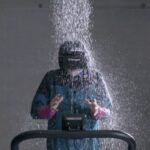Real-time training for fluid power industry
A recent research project between Deakin University, HYDAC, and the IMCRC (Innovative Manufacturing CRC) is driving the creation of a virtual and augmented reality solution for training. This technology will support and guide trainees and maintenance staff in real-time, through the steps required to safely serve hydraulics components.
The project, compiled over a series of 12 months, enhances the features and functionality of the current prototype strategy to help drive the commercialisation of the training solution from HYDAC. According to the Managing Director of HYDAC, Mark Keen, the intention was to develop a tech-driven training opportunity that would allow for high-level product training and assist in scaling the service worldwide.
A New Reality for Training
Keen noted that the research project has allowed for the thorough exploration of the technology features and functions of extended reality training. Going forward, the focus should be on how information in the virtual training environment will guide and empower different users.
When HYDAC set out to develop a VR training system, they envisioned a future where much of the visual content could be implemented into an AR environment for a fully cohesive learning experience. The support of the IMCRC program has allowed the VR and AR elements of the innovation to join together into a single learning solution. This allows for better trainee and maintenance staff support through VR and AR.
Director of Deakin Motion Lab, Stefan Gretuar, says that the research team is concentration on interaction design that will enable hands-on interactions and a consistently connected training experience for AR and VR device users. Providing custom training experiences through AR and VR reduces the environmental impact of the training activities used by HYDAC.
Deakin University is currently recruiting a programmer to work with both Deakin Motion Lab, and HYDAC. The Manufacturing Innovation Manager, Dr. Matthew Young, notes that innovative solutions for training and collaboration have been top of mind since the pandemic began in 2020. A virtual training environment, like that built by HYDAC will apply to a range of industry sectors.
Empowering Better Learning Strategies
There are various situations where application engineers and technicians won’t have access to physical products and components needed for training. Remote collaboration and training opportunities through extended reality could be critical to Australia’s future.
The VR/AR training solutions from HYDAC could open the door to a host of possibilities, helping manufacturers to access ongoing support and skill development, regardless of where they are. HYDAC is keen to accelerate the commercialisation of the training option.
According to keen, the faster the company can offer complete site support and training packages, the better. Early adopters of the technology are likely to be military personnel and defence groups because the sector is highly reliant on strong levels of technical support in training.
Quelle:



